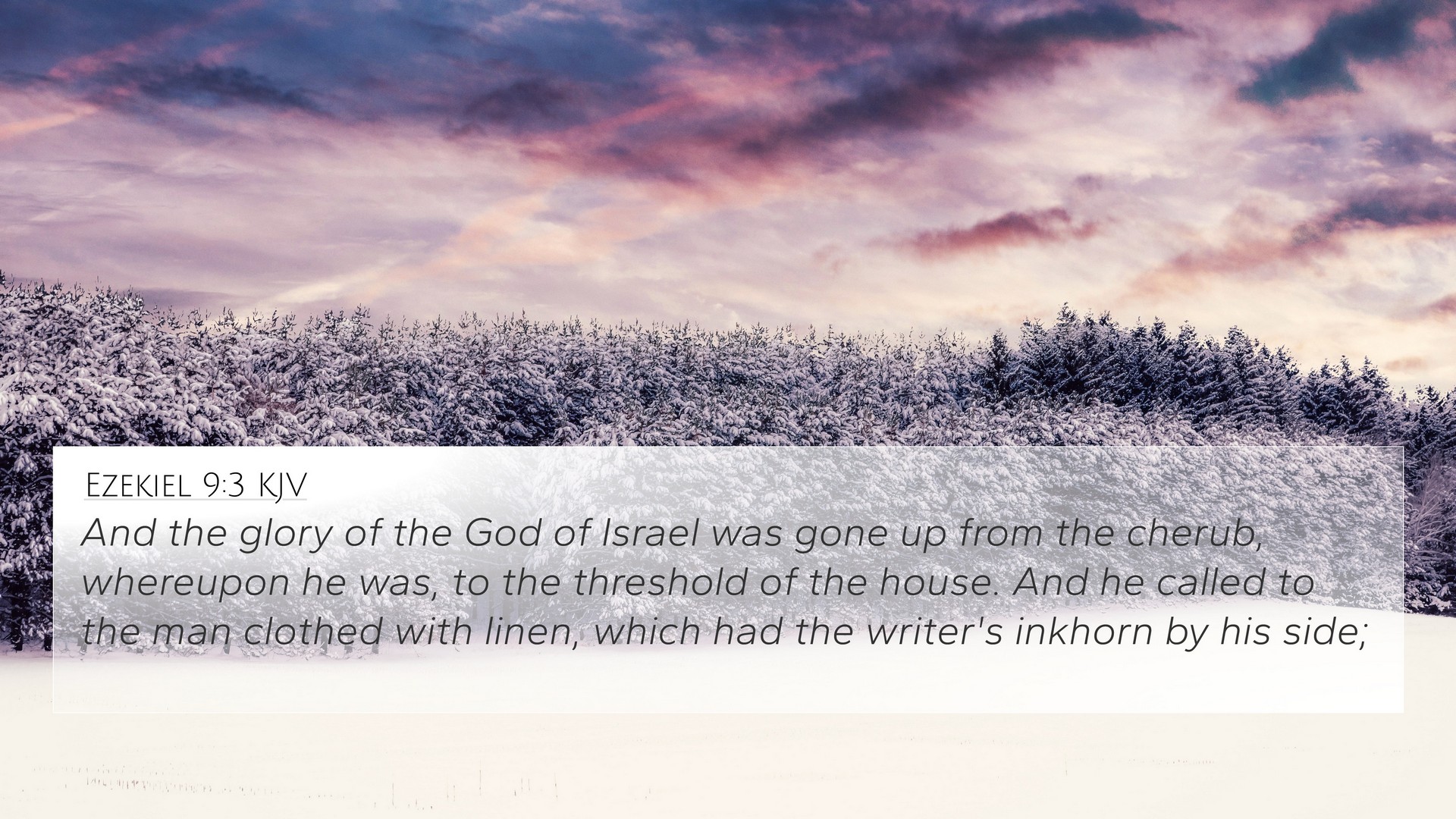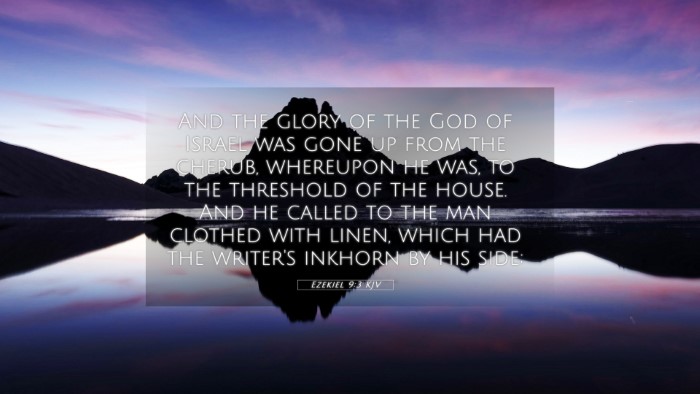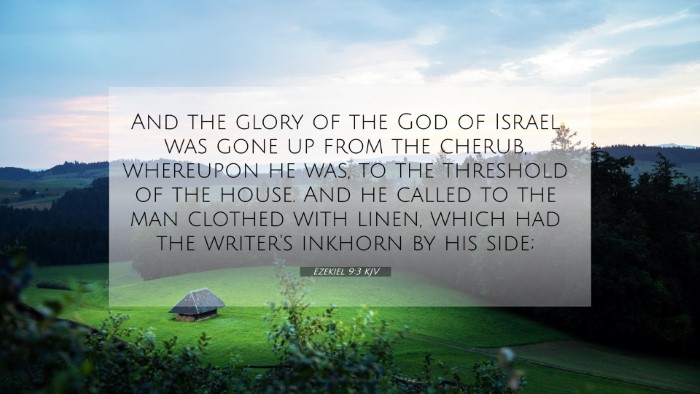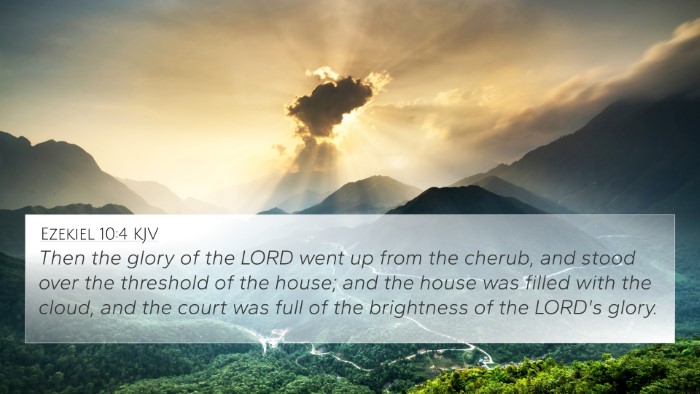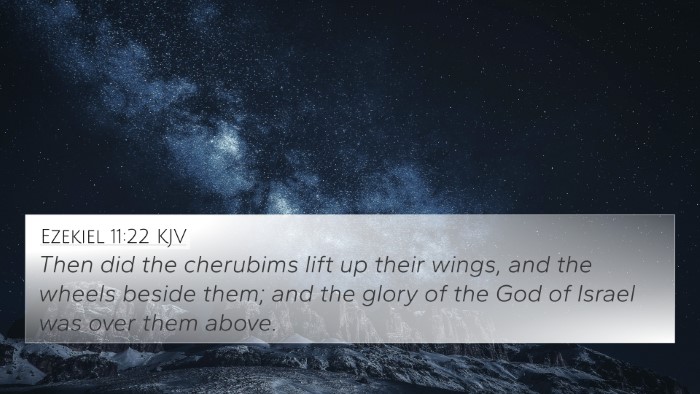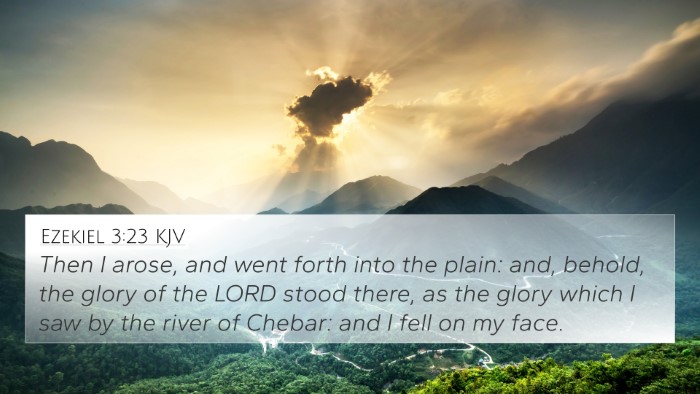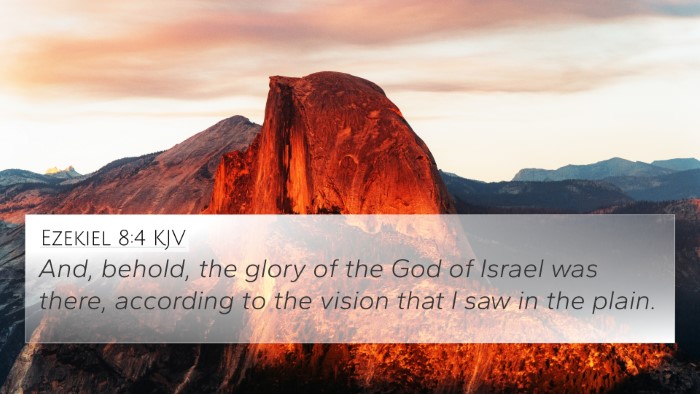Ezekiel 9:3 - Summary and Interpretation
Ezekiel 9:3 states: "And the glory of the God of Israel was gone up from the cherub, whereupon he was, to the threshold of the house. And he called to the man clothed with linen, which had the writer's inkhorn by his side." This verse presents significant implications regarding divine presence and the impending judgment upon Jerusalem.
Meaning and Insights from Commentaries
The interpretations from renowned public domain commentaries such as Matthew Henry, Albert Barnes, and Adam Clarke provide deep insights into the themes present in this verse.
Matthew Henry's Commentary
Matthew Henry explains that the departure of the glory of God signifies a serious judgment against the people of Israel. He emphasizes the gravity of God's presence leaving the temple, which symbolizes the withdrawal of His favor and protection. Henry remarks that the act of calling the man with the inkhorn reflects God's intention to mark those who lament the abominations in the city, implying a distinction between the faithful and the unfaithful. This marks a pivotal moment as God identifies those who remain faithful amidst moral decay.
Albert Barnes' Commentary
Albert Barnes focuses on the connection between the vision given to Ezekiel and the reality of Israel's situation. He notes that the "glory of the God of Israel" moving away from the cherub signifies a critical point in Israel's history, particularly concerning their idolatry and rebellion. Barnes points out that this was not merely a physical departure but a spiritual and relational disconnection between God and His people. Furthermore, the action of marking the faithful serves as a protection against the coming judgment, illustrating God’s mercy amidst His justice.
Adam Clarke's Commentary
Adam Clarke elaborates on the symbolic meaning of the cherubim as representations of God’s omni-presence and throne. He interprets the movement of divine glory as a clear indication that judgment is imminent. Clarke stresses the importance of the character of the man with the inkhorn, noting that it signifies God's awareness of human affairs and His concern for justice. The command to mark those who sigh and cry for the abominations indicates a moral outcry against the sins of the society they lived in.
Bible Cross References
- Ezekiel 8:6 - This verse elaborates on the abominations committed in the temple, reinforcing the context of judgment.
- Ezekiel 10:4 - It describes the departing glory of the Lord, linking to the theme of God's withdrawal.
- Revelation 7:3 - God marks His servants, parallel to the act of marking the faithful in Ezekiel.
- Ezekiel 22:30 - God searches for someone to stand in the gap, showing the importance of intercession amidst judgment.
- Isaiah 63:10 - This emphasizes the grief of the Holy Spirit when faced with disobedience and rebellion.
- 2 Peter 2:9 - Shows God's ability to rescue the righteous from trials, connecting to the protection implied in Ezekiel.
- Romans 11:4-5 - Highlights a remnant chosen by grace, resonating with the idea of God preserving the faithful.
- Matthew 5:8 - The blessedness of the pure in heart ties to those who mourn over sin, similar to the marking of those who lament in Ezekiel.
- Jeremiah 5:1 - Calls for a search for a righteous person, paralleling the quest for the faithful in Ezekiel 9:3.
- Luke 18:7 - God’s justice for His elect who cry out to Him day and night relates to the theme of divine response to the faithful.
Connecting Themes and Implications
This verse not only serves as a severe warning of imminent judgment but also highlights God's mercy in recognizing the faithful. Through the lens of cross-referencing biblical texts, one can see the interconnectedness of God's justice and grace throughout Scripture. Cross-referencing this verse with others enriches our understanding of how God interacts with humanity through both judgment and mercy.
Inter-Biblical Dialogue
The themes of God's glory, judgment, and the marking of the faithful resonate throughout the Bible. Understanding these motifs in Ezekiel invites readers to explore deeper connections within scripture and recognize the consistent moral call across both the Old and New Testaments.
Conclusion
In summary, Ezekiel 9:3 serves as a profound reminder of God's sovereignty, the weight of sin, and the hope for the faithful amid impending judgment. By engaging in comparative Bible verse analysis and exploring thematic connections, believers are invited to reflect on their own relationship with God and the importance of standing firm in faith.
